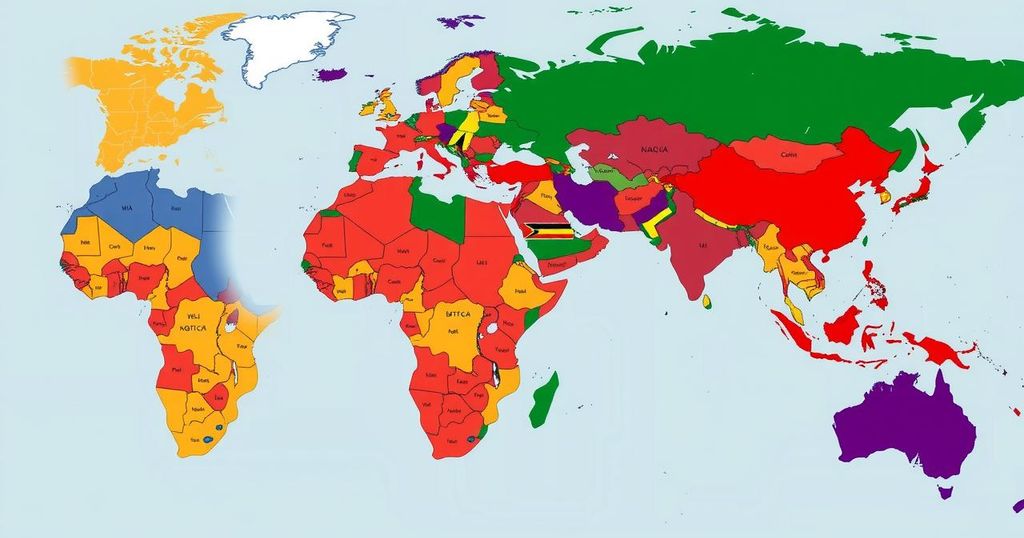Recent elections in Africa reveal a notable rejection of ruling parties as opposition candidates gain significant victories. Key issues such as economic performance, corruption, and governance failures prompted voter shifts. Countries including Ghana, Botswana, Senegal, and Mauritius experienced complete transfers of power, while young voters are increasingly dissatisfied with long-standing political parties, signaling a demand for more responsive leadership.
Recent elections across several African nations have highlighted a significant trend in voter attitudes toward ruling parties, leading to unprecedented electoral outcomes. In Ghana, jubilant supporters of the National Democratic Congress (NDC) celebrated the decisive victory of John Dramani Mahama, who triumphed over Vice President Mahamudu Bawumia of the New Patriotic Party (NPP) by a remarkable margin, signaling a clear voter rejection of the ruling party amid rising discontent regarding economic performance and governance.
The recent electoral year was notable for its outcomes, as countries such as Ghana, Botswana, Mauritius, and Senegal witnessed complete power transfers. Voter sentiment across these nations was profoundly influenced by shared concerns regarding economic hardship, job creation challenges, and growing corruption. Notably, in Ghana, inflation and governance failures adversely impacted the NPP, culminating in a significant decline in voter turnout among its supporters, further impacting the party’s electoral fate.
The situation in Southern Africa echoed similar sentiments, with historical liberation parties losing ground significantly among the youth demographic. In South Africa, the African National Congress (ANC) saw its parliamentary majority vanish for the first time since the end of apartheid, a reflection of public disillusionment with its handling of economic crises. In Botswana, the dominance of the Botswana Democratic Party (BDP) faced an abrupt end, yielding only four seats in Parliament after leading the country for over half a century, as opposition movements united to drive change.
Instances of ascending opposition parties were evident in Senegal and Mauritius, where corruption scandals and governance issues spurred violent protests and electoral losses for incumbents. Furthermore, the outcomes in Namibia and Mozambique demonstrated shifts in voter allegiances, indicating growing dissatisfaction with long-standing ruling parties.
The evident rise of opposition successes illustrates an evolution in African democratic institutions, as citizens increasingly prioritize accountability and responsiveness from their elected representatives. Observers note a significant shift in voter behavior, with citizens now assessing candidates based on their competence rather than ethnic or religious affiliation.
The implications of these electoral changes across Africa denote a growing transformation in political engagement. Analysts regard this wave of transitions as a wakeup call for governments to listen to the collective will of their constituents and adapt accordingly, lest they face similar electoral repercussions in the future. The outcomes serve as a pivotal lesson for all African governments: effective governance is paramount and citizens are both conscious and active participants in the democratic process.
The electoral landscape in Africa has been undergoing a transformation, particularly in the wake of significant economic challenges and governance failures. With globalization and the rise of social media, voters are increasingly informed and active, seeking change from long-standing ruling parties. Economic indicators such as inflation, unemployment, and corruption play vital roles in shaping electoral outcomes. This shifting paradigm reflects disillusionment with traditional political parties, particularly among young voters who lack historical ties to the achievements of liberation movements. Analysts attribute recent electoral shifts to citizens’ growing awareness of accountability and effective governance, marking a turning point in African politics.
In conclusion, the recent electoral shifts across various African nations indicate a significant change in voter expectations and behaviors. The decisive victories of opposition parties exemplify the demand for accountability, economic progress, and effective governance. As voters continue to demand responsiveness from their leaders, it becomes clear that governments must adapt to the evolving political landscape or risk facing electoral consequences. This emerging trend underscores the increasing importance of civic engagement and the necessity for transparency in governance throughout the continent.
Original Source: www.aljazeera.com






